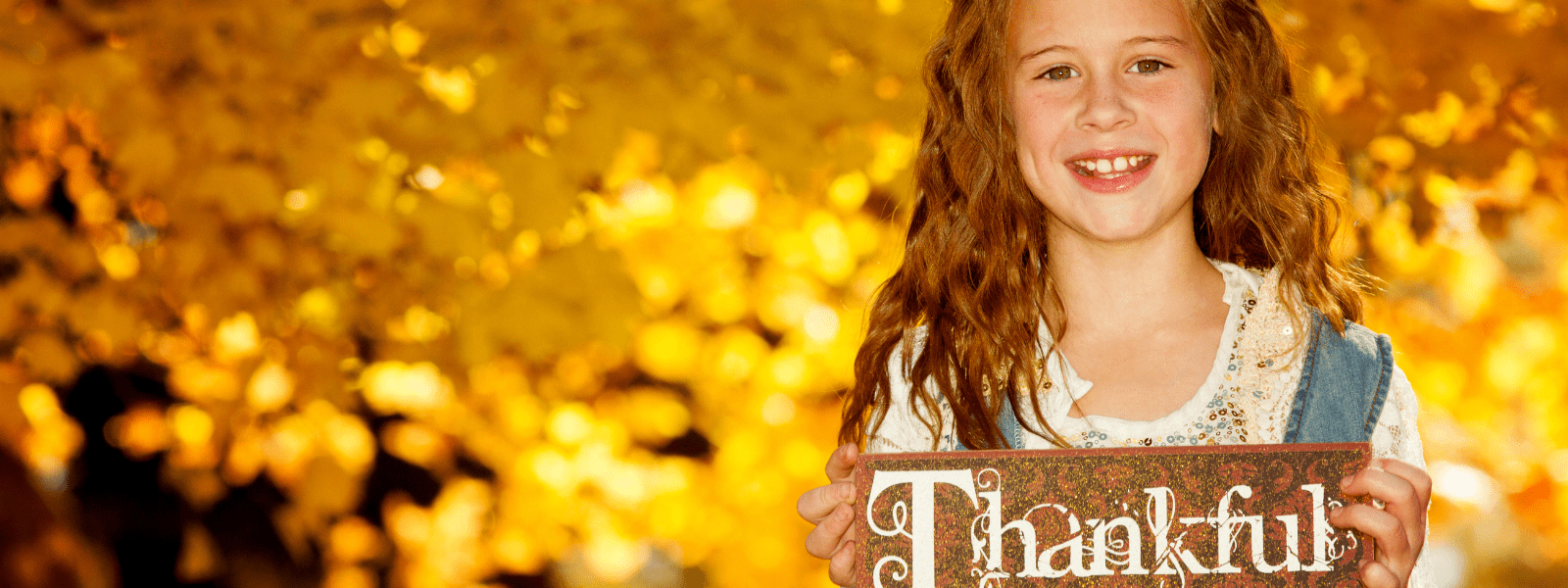7 Gratitude Tips for Kids
It’s the season of thankfulness, and if you’re thinking, “Man, my kid doesn’t really get what gratitude even is!”, you are not alone. We teach our kids to say “Thank you” at a very early age, but how do we help them take gratitude beyond this basic pleasantry? Here are 7 gratitude tips to make this more real for your family this season:
1. Involve your kids more in day-to-day tasks and planning
Feel like your kids aren’t grateful for all that you, their teachers, or other care-givers do for them on a daily basis? Let them feel the stress of it in an age-appropriate way! Involve them in your planning process for a week of getting them where they need to go. Give them some responsibility (like packing lunches, planning some meals, or putting away laundry).
Even though at first this might be met with more grumbling, having conversations about all the people who do the hard jobs can help open your kids to being more grateful!
2. Build empathy by helping them find ways to help others
Many kids want to help others naturally, others need a shift in perspective. Whether it’s a family service project, helping grandparents with tasks, or even just doing something nice for their siblings, building a sense of community, empathy, and gratitude in your home can go a long way.
Kids who feel like what they are doing really matters are more likely to be empathetic leaders as they get older. Acknowledging that some people are not as fortunate as them — and that even they are able to help — is a great way to build empathy and gratitude all year long.
3. Point out others being generous or helpful
Sometimes kids are so wrapped up in their own world that they don’t even know when to show gratitude. Intentionally pointing out when someone goes out of their way to help, or when someone goes beyond what is expected can help kids begin to notice these things for themselves.
Especially during the rush of the holiday season, be on the lookout for ways to point these things out and express gratitude. Whether it’s someone letting you go ahead of them in a line, a stranger helping a frazzled mom bag her groceries, or some other small kindness, help your kids see these good things going on around them so they can recognize it when it’s done to them!
4. Practice positive talk, even when things are hard
It’s easy to get bogged down in changed plans, stressful situations, or hard tasks. Instead of wallowing, help your kids look for positives that they can still be grateful for.
- It’s snowing so now we can’t go to the concert → At least now we can do all of our favorite winter activities at home!
- Ugh, there’s more traffic on the way to grandma’s… → Let’s spend this time playing a road trip game or thinking of some fun things we will get to do when we get there!
- One of their friends cancels plans. → Hey, I’m SO grateful that I get this extra evening with you! Let’s find something fun to do.
Helping your kids learn to look for the silver lining can make gratitude come more naturally.
5. Make gratitude a habitual part of every day
Whether it’s around the dinner table, during your bedtime routines, or a quick family group-text check-in, make finding things to be grateful for a part of every day. Kids may roll their eyes at this, but the habit of looking for the good things will help them be more thankful as they get older!
6. Find fun ways to show gratitude
Just like we all feel and express love differently, we can all show gratitude in slightly different ways. Help your kids think through ways they feel appreciated and then come up with some fun, unique ways to express gratitude to others. This could be things like:
- A smile and thumbs up to a stranger
- Saying thank you in different languages, when appropriate
- Writing notes or taking selfies to send to friends or family members
- Thinking of small gifts to give to people who have blessed you
7. Model it!
Ultimately, the best way your kids are going to learn to show gratitude is by watching YOU be more obvious in your own gratitude practices. Don’t be shy about saying thank you, involving your kids in the notes you write or the gifts you send, or the service you do in your own community. When kids see gratitude as a part of the family culture, they will more naturally step into it as well.
What’s Going on When Gratitude Tips Don’t Help?
Sometimes we hear from families that their child just can’t think of others around them. Or they are so wrapped up in their own world that there’s no breaking through. Or they just can’t think through abstract situations.
Believe it or not, these are also real-life signs of weak cognitive skills like logic & reasoning, attention, or executive functioning.
Cognitive skills impact more than just learning. They govern the way your brain interacts with the world in any and all situations! If you’re wondering how your kids’ skills rank, take this FREE brain skills quiz today to get started!







